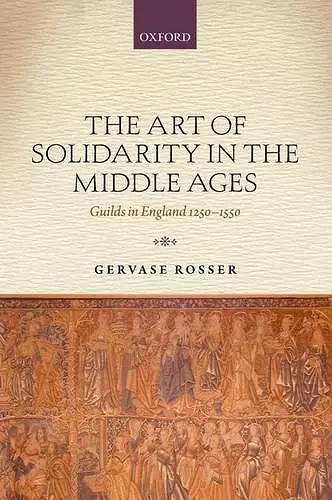The Art of Solidarity in the Middle Ages
Guilds in England 1250-1550
Format:Hardback
Publisher:Oxford University Press
Published:19th Mar '15
Currently unavailable, and unfortunately no date known when it will be back
This hardback is available in another edition too:
- Paperback£31.99(9780198735786)

Guilds and fraternities, voluntary associations of men and women, proliferated in medieval Europe. The Art of Solidarity in the Middle Ages explores the motives and experiences of the many thousands of men and women who joined together in these family-like societies. Rarely confined to a single craft, the diversity of guild membership was of its essence. Setting the English evidence in a European context, this study is not an institutional history, but instead is concerned with the material and non-material aims of the brothers and sisters of the guilds. Gervase Rosser addresses the subject of medieval guilds in the context of contemporary debates surrounding the identity and fulfilment of the individual, and the problematic question of his or her relationship to a larger society. Unlike previous studies, The Art of Solidarity in the Middle Ages does not focus on the guilds as institutions but on the social and moral processes which were catalysed by participation. These bodies founded schools, built bridges, managed almshouses, governed small towns, shaped religious ritual, and commemorated the dead, perceiving that association with a fraternity would be a potential catalyst of personal change. Participants cultivated the formation of new friendships between individuals, predicated on the understanding that human fulfilment depended upon a mutually transformative engagement with others. The peasants, artisans, and professionals who joined the guilds sought to change both their society and themselves. The study sheds light on the conception and construction of society in the Middle Ages, and suggests further that this evidence has implications for how we see ourselves.
[a] meditation on the moral power of voluntary associations to negotiate the relationship between individuals and society as well as to construct social solidarity ... Recommended * J. P. Huffman, CHOICE *
Rosser's welcome new study explores the nature of and motives for creating and joining a parish guild and in so doing raises important questions about medieval individuality and community. * Katherine L. French, American Historical Review *
This concise and compelling book by Gervase Rosser is the distillation of many years' original research and deep thought about guilds in medieval Europe ... this is an important book that makes bold arguments, which demand a thoughtful response. Rosser makes an eloquent and compelling case for guilds being altogether more varied, complex and interesting than much of the existing scholarship has allowed. * I. Forrest, English Historical Review *
this book offers enormously inspiring reading ... it is not only relevant to readers interested in English social and cultural history or in the European Middle Ages in general, but to a wide range of scholars in the humanities. * Josef Ehmer, Renaissance Quarterly *
ISBN: 9780198201571
Dimensions: 240mm x 162mm x 22mm
Weight: 536g
250 pages